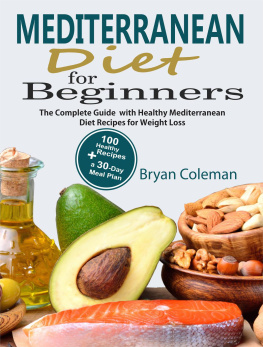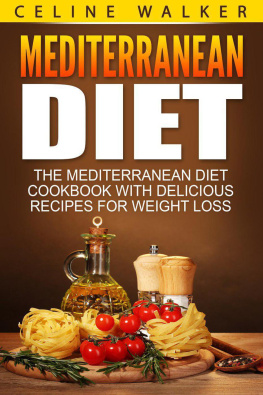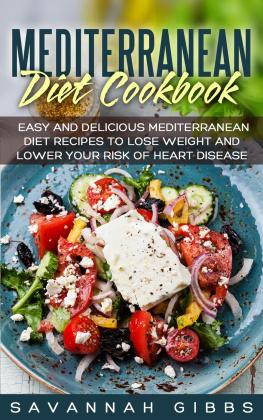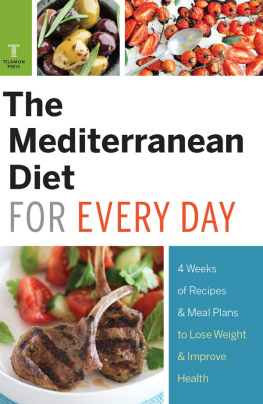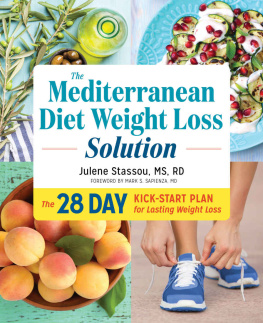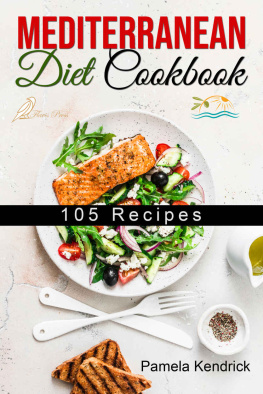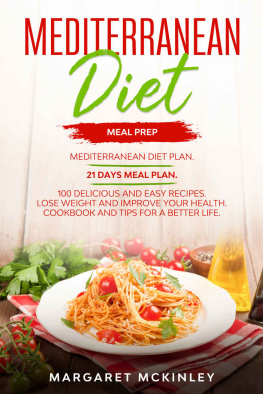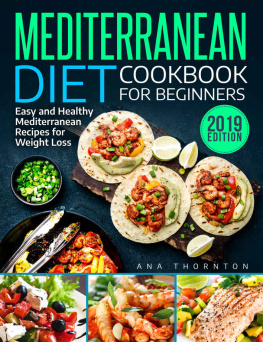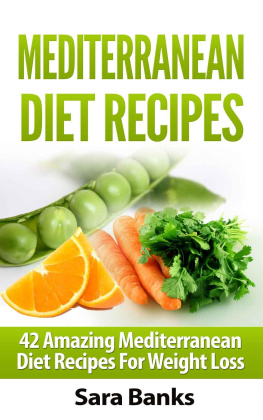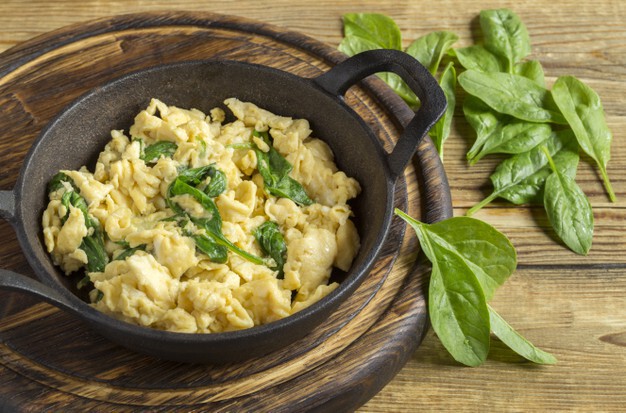Mediterranean Diet Cookbook
60 Delectable Mediterranean Diet Recipes
BY
April Blomgren
Copyright 2020 April Blomgren
License Notes
No part of this Book can be reproduced in any form or by any means including print, electronic, scanning or photocopying unless prior permission is granted by the author.
All ideas, suggestions and guidelines mentioned here are written for informative purposes. While the author has taken every possible step to ensure accuracy, all readers are advised to follow information at their own risk. The author cannot be held responsible for personal and/or commercial damages in case of misinterpreting and misunderstanding any part of this Book
Thanks for Purchasing My Book! Heres your reward!
Thank you so much for purchasing my book! As a reward for your purchase, you can now receive free books sent to you every week. All you have to do is just subscribe to the list by entering your email address in the box below and I will send you a notification every time I have a free promotion running. The books will absolutely be free with no work at all from you! Who doesnt want free books? No one! There are free and discounted books every day , and an email is sent to you 1-2 days beforehand to remind you so you dont miss out. Its that easy! Enter your email now to get started!
Author Page: https://www.amazon.com/author/april-blomgren
Table of Contents
Introduction
People living in the Mediterranean countries namely Spain, Greece, and Italy tend to live longer. Apart from the obvious secrets like weight control and active lifestyle, the people in the regions eat food that consists of healthy foods. The diet's foods include high amounts of olive oil, legumes, nuts, seeds, vegetables, and whole grains and low on saturated fat, sugar, and red meat. It also consists of fish and seafood, which are ideally consumed once or twice a week. Eggs, cheese, and yogurt are consumed moderately, about once a week.
The diet does not ask you to count calories, work out your macronutrients or weigh your food, which is why it has long term benefits. You will have to determine if the amount you are eating is within moderation or not. It requires you to limit processed and sugary foods that are high in calories. Just making the small change will already help you get your calorie intake under control. It may seem complicated, especially if you struggle with binge eating. Still, you will soon realize that if you feed your body with wholesome food, you will feel better physically and emotionally, and in the end, will instinctively eat less.
Although you will lose weight while eating delicious food, eating the Mediterranean way is about more than weight loss. It is about a healthy body and mind. The diet offers a range of health benefits like diabetes control and prevention, improved brain and heart health, preventing cancer and weight loss. If you successfully follow the Mediterranean diet, you will reduce weight and stay clear of chronic diseases.
This book has covered almost everything with 60 delicious and healthy recipes for all seasons at your table that you need to know to follow the diet. The recipes included in the book will help you understand the Mediterranean food pyramid without being overly complex. You won't need to follow complicated recipes or spend hours a day in the kitchen to eat healthily. If you know the basics of which foods are right for you and why, and the foods to avoid, you'll be able to make the meals as intricate or simple as you see fit.
Any time you make changes to your diet or lifestyle, it's essential you first speak to your physician about your desire for better health and what you're hoping to gain from the new diet. The Mediterranean diet can be beneficial for many people, but your personal health history matters. If you should not be consuming alcohol, have severe health concerns or take medication throughout the day, you must speak to your doctor about what adjustments you can make and if the diet is right.
Armed with the straightforward yet enticing recipes, youll have more chances to slow down and savor food with friends; its the Mediterranean way, and it just happens to be healthier.
The Mediterranean Food Pyramid
The Pyramid of Mediterranean diet guides you about the foods consumed in large, moderate and low amounts. The Pyramid takes explicitly into consideration both of the quantitative and qualitative elements for eating choices.
As we move up on the Pyramid, seafood and fish are the most prominent elements. Further up, you will find poultry, cheese, yogurt, and eggs used in moderate amounts. The top consists of sweets and meats that should be consumed in the least often and small quantities.
Sweets and Meats:
At the top of the Pyramid are meats and sweets. They need to be eaten occasionally and in smaller portions. Opt for lean cuts like tenderloin, T-bone, flank, etc. instead of the fattier meats. Treat sweets and sugary foods as little celebrations that need to be consumed occasionally.
Poultry, Cheese, Yogurt, and Eggs:
They are integral components of the Mediterranean diet and need to be included in moderate amounts, at least 3 to 4 times a week. The portion size should be moderate. You can have cheese regularly, but the right ones and in small amounts.
Seafood and Fish:
Seafood comprises most of the sources of protein in the Med diet. The preferred fish include herring, tuna, sardines, and salmon since they're enriched in omega-3 fatty acids that are great for heart health. Seafood includes shellfish like shrimp, oysters, clams, and mussels as they too are filled with good fats. Ideally, seafood and fish should be consumed twice a week.
Fruits, vegetables, whole grains, herbs, healthy fats, and beans:
They are the heart of the diet. They should be the base of each meal and should consist of the biggest portion of your plate. Use olive oil as your ultimate source of healthy fat and be used as a dressing or cooking and baking.
Physical Activity:
Apart from dietary guidelines, the Med lifestyle also focuses on leading a physically active lifestyle. Apart from the main components, the diet also focuses on drinking a lot of water and some wine regularly.
Foods to Limit or Avoid
Sweetened Grains:
Sweetened cereals, snack foods, and other sweetened grains or its products
Sauces and Condiments:
Teriyaki sauce, barbecue sauce, and ketchup
Red meat
You should reduce red meat in the Mediterranean diet since it can contribute to heart disease, but you don't have to actually avoid it altogether. Try to choose a small portion of lean red meat, and keep it down to three to four times per month.
Added Sugars:
It includes candies, ice cream, table sugar, and soda.
Refined Grains:
It includes pasta thats made of refined wheat and white bread.
Trans Fat:
It can certainly be found in various processed foods, but its also in margarine!
Refined Oils:
It includes cottonseed oil, vegetable oil, canola oil, and soybean oil.
Butter or animal fats
Hydrogenated oils (palm kernel oil, palm oil, etc.)








